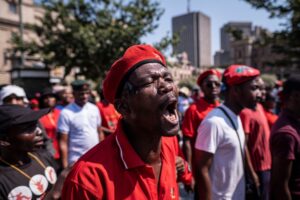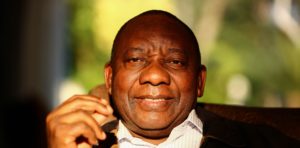Ten years after his death, the legacy of Nelson Mandela, for those few South Africans who bother to think about it, remains elusive. To many, he embodied a lost civility in interracial politics, a generosity of spirit, an unswerving faith in the Rainbow Nation. To others, especially a new generation of black extremists mustered under the banner of Radical Economic Transformation (RET), he was merely an old man who suffered much to little effect: he was too forgiving.
Such views miss the significance of the man who, together with former president Frederik Willem de Klerk, helped steer his country away from imminent disaster. The tragedy now playing out in the Middle East should remind South Africans how fortunate they were to have such visionaries at a unique moment in national history.
Mandela had three things going for him: he was a decent man; his long incarceration had kept him untainted by all the bad things that happened during his liberation movement; and, crucially, his only five-year term in office came while the sinews of the civil and security services of the departed apartheid system could still hold the state together — in a sense they bore him on their hands. His successors had no such luck.
Yet the former president had little interest in, or understanding of, the minutiae of government. He governed by halo reputation, charm and an engaging naiveté. All problems could be dismissed with an incomparable smile and a witty comment. It could not last of course; not in a multi-riven country like South Africa.
When I was editor of the South African Sunday Times during the political transition of the mid-Nineties, I engaged Mandela often, not always frictionlessly. He once chose to use a meeting of national editors to accuse white editors of telling black reporters what to write, which I pointed out was more demeaning to the latter than the former.
The subsequent frostiness was partly alleviated when I invited him to be the patron of a Sunday Times-sponsored expedition to put the first South African woman and the new flag atop Mount Everest. The expedition went haywire when its mercurial leader split the party at Base Camp 4, leaving only him and the two women members of the team to assail the heights. Our circulation rocketed but it fell to me to fly to Cape Town to tell our Patron the bad news.
“You mean the women are still prepared to go on?” Mandela asked.
“Yes,” I said.
“Then my patronage stands. Give them my best wishes.”
The policy legacies of his 111-year-old African National Congress (ANC) have, sadly, been neither as decisive nor noble. In a May 1990 address to the Consultative Business Movement, four years before taking office, Mandela sketched the broad strategic political and economic views of the ANC, emphasising the importance of full employment, maximum productivity, social consciousness, partnership between state and business, the growth of small businesses and of land reform. Although predictably heavy on old-style dirigisme, he insisted that nationalisation and redistribution weren’t the only words in the ANC vocabulary. “It is important that we should stop propagating the gloomy picture of South Africa that, as it is said, will inevitably sink into the economic crisis that afflicts many African countries,” he said.
How has that worked out for South Africa, after nearly 30 years of ANC rule? The party to which Mandela belonged now faces its Venezuela moment after ignoring for decades the catastrophic impact of its administrative, ideological and race-based preferment policies. The Government’s recent Medium Term Budget Statement (MTBPS) illustrates this in a nutshell. In the first six months of the financial year, the main budget deficit has grown by more than 50% to a chasmic R53 billion (£2.2 billion). On this trajectory, South Africa will have to repay R242.5 billion (£10.2 billion) a year in finance charges.
To blame are runaway spending on benefits (45% of South Africans receive social grants) and public service salaries (on average nearly twice as much as in the private sector), matched by a huge drop in taxes due to industries crippled by power interruptions (forfeiting 5% of GDP) and collapsing port facilities (another 4.9%). Economic growth has stalled at 0.1% and unemployment is at 32%, its highest ever, while a recent World Bank Report claims 10% of GDP is being robbed through crime. About 36% of water in most municipalities is lost through broken pipes and nearly one fifth of the electricity sold by the national energy provider to municipalities is stolen through illegal connections in informal settlements.
Meanwhile, vast amounts of state resources have been ploughed into stimulating micro and small businesses and rural co-operatives in line with Mandela’s vision. This has been overwhelmingly wasted through incompetence, corruption or indifference at both donor and recipient level. The latest, a mega-farm project for the Khutso-Naketsi Community Property Association, has collapsed through state tardiness and corruption by the trustees. Elsewhere, a lodestar job-creation programme is stalled due to a corruption probe, while KwaZulu Natal’s largest development agency, the 60-year-old Ithala, is poised to have its core functions closed by the prudential authorities because it has failed to report for two years. Its target customers are black youth and women.
Compared with middle-income countries, South Africa has a depressingly low number of black-owned micro, small and medium businesses. It is understandable: why bother starting your own business when the state will extort somebody else’s equity in an existing one on your behalf or, better still, grant you huge government subsidies that hardly hit the company accounts before ending up as a deposit on a SUV?
Mandela’s optimism was thus grievously wrong. And here lies the tragedy: inheriting a battered apartheid economy, Mandela and to a lesser extent his successor, Thabo Mbeki, appointed excellent finance ministers who pursued disciplined and productive spending in close co-operation with the business sector. That boosted growth and employment, bought significant benefits to the previously marginalised, and, at one point in the early 2000s, even wiped out the deficit and paid down apartheid-era loans. A still-competent state and parastatal network, capable of massive scaling to meet the new demands, was in place. Deep capital markets and an enviable skills base were available. The Australia (or Singapore) of Africa was ostensibly aborning.
But that promise was never fulfilled. The failure was largely the result of the ANC’s policy of racial preference in employment, investment, scholarships, tendering and trading. Under the guise of being a development project, black economic empowerment, or its buzzword, “transformation”, has been perverted into a multi-tentacled succubus, draining the economic life of the country and supporting a one-way flow of state sanctioned, expropriated wealth into the hands of a monstrously hungry and unproductive new business and public service elite comprising slightly more than 1% of the population. Exactly what Mandela did not want.
This so-called empowerment process has different iterations. One was the prototypic past endowment by white capitalists of swathes of equity on selected black leaders — the incumbent President is merely the most luminous of the many beneficiaries. Another is “cadre deployment” which has seen the drafting of large numbers of direly incompetent and corrupt party “cadres” into the public service and the State Operated Entities. At every conceivable level of state administration party, “tenderpreneurs” have inserted themselves as pestilential middlemen. According to a recent report by Ricardo Hausmann of Harvard’s Growth Lab, these operators have raised the cost of state purchasing by 20% without a scintilla of benefit to anybody but themselves. The empowerment system, meanwhile, has cost approximately 3% of GDP. Crime, corruption, cronyism and cluelessness are thus robbing the country of nearly a quarter of its GDP, and this in a country not even at war. Ukraine, besieged and a third occupied, by comparison, lost 30% of GDP last year.
The empowerment system underwrote South Africa’s so-called State Capture phase which flourished under the malignant reign of former president Jacob Zuma and involved crippling levels of embezzlement of state resources. Despite facing countless criminal charges in the High Courts, Zuma is being quietly rehabilitated into ANC structures to retain the Zulu vote. A disemboweled national prosecuting service, meanwhile, has been unable to land a single high-level conviction in five years.
Yet, typically, the ANC remains unbowed by its spectacular failures, preferring to fall back onto its default posture of blaming apartheid, the private sector and whites. Indeed, with a contentious general election looming next year in which it may lose its overall majority, the ANC is doubling down on its race preference policies and on social spending: a national basic income grant now looms and, against Treasury advice, an early implementation of legislation to allow pensioners to draw down some of their pensions. Part of it is electioneering, but much is driven by the view at all levels of ANC public representation that the window for graft may at last be closing.
South Africa now stands at arguably the most dangerous yet logical end phase of ANC-style one-way “empowerment”. Criminal cartels have effectively privatised and democratised the state-sanctioned project of wealth expropriation for their own account. In the construction industry, for example, so-called Business Forums seek to extort 30% of the value of all construction projects by violence. Most of the mainly black-owned taxi and long haulage sectors are cartelised, untaxed and in some cases criminalised. The R90 billion-a-year taxi industry, for example, paid R5 million in taxes last year.
President Ramaphosa, elected five years ago on the promise of clean and effective government, is powerless to address this scourge because so many of his party colleagues are beneficiaries, nor will he admit that its genesis lies in the “empowerment” dogma he still, against all evidence, so assiduously promotes. Like Tancredi Falconeri in Giuseppe Tomasi di Lampedusa’s classic, The Leopard, he wants everything to be changed for nothing to change. Mandela’s vision has been betrayed, and by his own comrades.
Disclaimer
Some of the posts we share are controversial and we do not necessarily agree with them in the whole extend. Sometimes we agree with the content or part of it but we do not agree with the narration or language. Nevertheless we find them somehow interesting, valuable and/or informative or we share them, because we strongly believe in freedom of speech, free press and journalism. We strongly encourage you to have a critical approach to all the content, do your own research and analysis to build your own opinion.
We would be glad to have your feedback.
Source: UnHerd Read the original article here: https://unherd.com/




